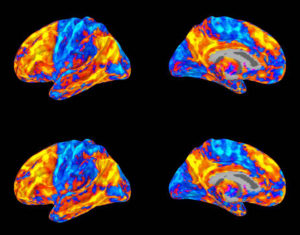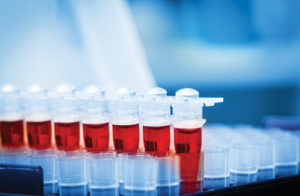Bay Biosciences provides high quality, clinical grade fresh frozen (-80C) sera (serum), plasma and peripheral blood mononuclear cells (PBMC) biofluid samples from unique patients suffering from Alzheimer’s Disease. The sera (serum), plasma and PBMC biofluid samples were collected from unique Alzheimer’s patients under customized collection/processing protocols provided by the customer.
Detailed clinical data and pathology annotations including patient’s corresponding diagnostic test values, MMSE score, MRI data associated with the sera (serum), plasma and PBMC biofluid samples are provided to a valued pharmaceutical customer for research and discovery.

Alzheimer’s Disease Overview
Alzheimer’s disease is a progressive neurologic disorder that causes brain to shrink (atrophy)and cells to degenerate and die. Alzheimer’s disease is the most common cause of dementia, a continuous decline in thinking, behavioral and social skills that disrupts a person’s ability to function independently. The early signs of the disease may be forgetting recent events or conversations. As the disease progresses, a patient with Alzheimer’s disease will develop severe memory impairment and lose the ability to carry out everyday tasks. Experts suggest that as many as 5.5 million Americans age 65 and older may have Alzheimer’s. According to the World Health Organization (WHO) around 50 million people have dementia worldwide, and there are nearly 10 million new cases every year. Alzheimer’s disease is the most common form of dementia and may contribute to 60–70% of cases.
Common symptoms of Alzheimer’s disease include memory loss, language problems, and impulsive or unpredictable behavior. One of the main features of the condition is the presence of plaques and tangles in the brain. Another feature is a loss of connection between the nerve cells, or neurons, in the brain. These features mean that information cannot pass easily between different areas of the brain or between the brain and the muscles or organs. As the symptoms worsen, it becomes harder for people to remember recent events, to reason, and to recognize people they know. Eventually, a patient with Alzheimer’s disease may need full-time assistance.
Signs and Symptoms of Alzheimer’s Disease
Memory loss problems are typically one of the first signs of cognitive impairment related to Alzheimer’s disease. Some people with memory problems have a condition called mild cognitive impairment (MCI). The first symptoms of Alzheimer’s vary from person to person. For many, decline in non-memory aspects of cognition, such as word-finding, vision/spatial issues, and impaired reasoning or judgment, may signal the very early stages of Alzheimer’s disease. Alzheimer’s disease symptoms appear gradually, over months or years.
Following are the common signs and symptoms of Alzheimer’s disease:
- Memory loss: A person may have difficulty taking in new information and remembering information. This can lead to:
- Repeating questions or conversations
- Losing objects
- Forgetting about events or appointments
- Wandering or getting lost
- Cognitive deficits: A person may experience difficulty with reasoning, complex tasks, and judgment. This can lead to:
- Reduced understanding of safety and risks
- Problems with managing money or paying bills
- Problems with making decisions
- Difficulty completing tasks that have several stages, such as getting dressed
- Problems with recognition: Alzheimer’s patient may become less able to recognize faces or objects or less able to use basic tools. These issues are not due to problems with eyesight.
- Problems with spatial awareness: Alzheimer’s patients may have difficulty with their balance, trip over, or spill things more often, or they may have difficulty orienting clothing to their body when getting dressed.
- Problems with speaking, reading, or writing: Alzheimer’s patients may develop difficulties with thinking of common words, or they may make more speech, spelling, or writing errors.
- Personality or behavior changes: Alzheimer’s person may experience changes in personality and behavior that include:
- becoming upset, angry, or worried more often than before
- a loss of interest in or motivation for activities they usually enjoy
- a loss of empathy
- compulsive, obsessive, or socially inappropriate behavior

Bay Biosciences is a global leader in providing researchers with high quality, clinical grade, fully characterized human tissue samples, bio-specimens and human bio-fluid collections from cancer (tumor) tissue, cancer sera (serum), cancer plasma cancer PBMC and human tissue samples from most other therapeutic areas and diseases.
Bay Biosciences maintains and manages it’s own bio-repository, human tissue bank (biobank) consisting of thousands of diseased samples (specimens) and from normal healthy donors available in all formats and types. Our biobank procures and stores fully consented, deidentified and institutional review boards (IRB) approved human tissue samples and matched controls.
All our human human tissue collections, human specimens and human bio-fluids are provided with detailed samples associated patient’s clinical data. This critical patient’s clinical data includes information relating to their past and current disease, treatment history, lifestyle choices, biomarkers and genetic information. Patient’s data is extremely valuable for researchers and is used to help identify new effective treatments (drug discovery & development) in oncology, other therapeutic areas and diseases. This clinical information is critical to demonstrate their impact, monitor the safety of medicines, testing & diagnostics, and generate new knowledge about the causes of disease and illness.
Bay Biosciences banks wide variety of human tissue samples and biological samples including cryogenically preserved -80°C, fresh, fresh frozen tissue samples, tumor tissue samples, FFPE’s, tissue slides, with matching human bio-fluids, whole blood and blood derived products such as serum, plasma and PBMC’s.
Bay Biosciences is a global leader in collecting and providing human tissue samples according to the researchers specified requirements and customized, tailor made collection protocols. Please contact us anytime to discuss your special research projects and customized human tissue sample requirements.
Bay Biosciences provides human tissue samples (human specimens) from diseased and normal healthy donors; including peripheral whole-blood, amniotic fluid, bronchoalveolar lavage fluid (BAL), sputum, pleural effusion, cerebrospinal fluid (CSF), serum (sera), plasma, peripheral blood mononuclear cells (PBMC’s), saliva, Buffy coat, urine, stool samples, aqueous humor, vitreous humor, kidney stones, renal calculi, nephrolithiasis, urolithiasis and other bodily fluids from most diseases including cancer. We can also procure most human bio-specimens and can do special collections and requests of human samples that are difficult to find. All our human tissue samples are procured through IRB approved clinical protocols and procedures.
In addition to the standard processing protocols Bay Biosciences can also provide human plasma, serum, PBMC bio-fluid samples using custom processing protocols, you can buy donor specific sample collections in higher volumes and specified sample aliquoting from us. Bay Biosciences also provides human samples from normal healthy donors, volunteers, for controls and clinical research, contact us Now.
日本のお客様は、ベイバイオサイエンスジャパンBay Biosciences Japanまたはhttp://baybiosciences-jp.com/contact/までご連絡ください。
